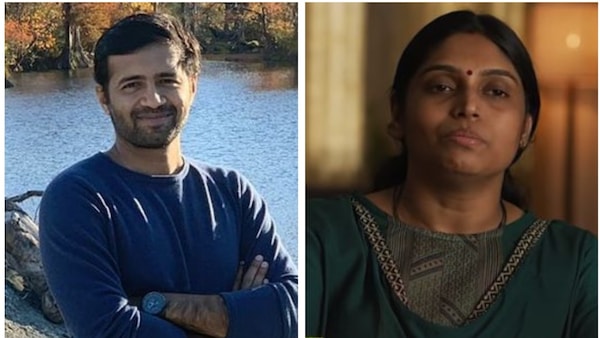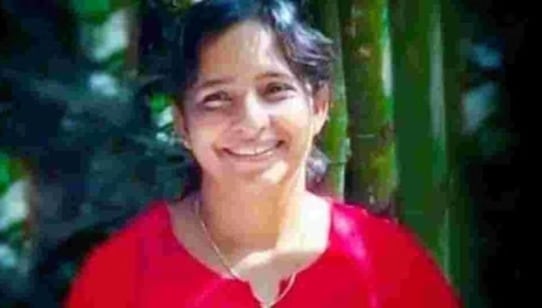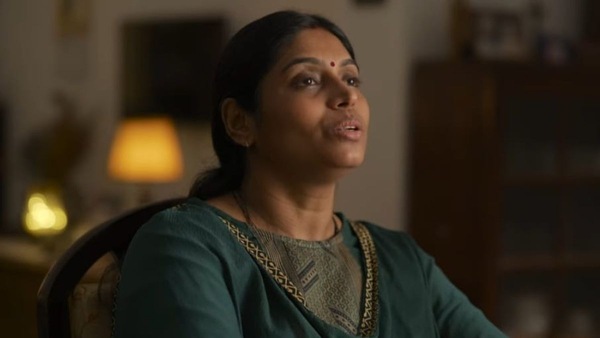Exclusive! Director Christo Tomy on his Netflix documentary on alleged serial killer Jolly Joseph
Christo Tomy's 90-minute docu-feature explores the story of the woman, Jolly Joseph, who is alleged to have killed 6 people in the span of 14 years by plying them with cyanide-laced food

Last Updated: 03.21 PM, Dec 05, 2023
On December 22, Netflix’s latest true-crime documentary, Curry & Cyanide: The Jolly Joseph Case, drops on the platform. Unlike most of the streamer’s other documentaries in the genre, where the subject has some sense of finality – either the perpetrator has been brought to justice, is dead or, in some cases, still at large, Curry & Cyanide’s focal character, Jolly Joseph’s case is still sub-judice, so, the presumption ‘innocent until proven guilty’ holds true for her. But the nature of her alleged crimes and the media trial that unfolded after they came to light have branded her a monster in the minds of most people who have followed the case. Jolly Joseph, the middle-aged woman who allegedly killed several people in her family over the course of 14 years, by lacing their food with cyanide. This is the tale that National Award-winning short film maker Christo Tomy is presenting in the 90-minute docu-feature, which is his debut in the genre.

Jolly Joseph is currently in the midst of a trial in which she has been charged with murder, conspiracy and forgery, having allegedly conspired with other parties and carried out the murder of six people, including a child, and forging property documents in her benefit. “This is a case that had a lot of media attention and our documentary is a retelling of much of what is in the public domain. The trial is still on and there’s a long way to go, so, we’ve ended the documentary with the current status of the case,” Christo tells OTTplay, adding that since the official trailer of the show is not out yet, there’s limited information that he can share about the docu-feature at this point.
“I was approached by Netflix to direct a documentary on the infamous Jolly Joseph case. Once I came onboard, we hired a writer, Shalini (co-writer on Soorarai Pottru) to write the script. Along with a team of researchers, over a period of about 6 months, we fleshed out the script. It is a standalone film, like any standard Netflix true-crime documentary, with interviews of people who were personally affected by the case, as well as some expert comments and dramatization of events. The story is going to be narrated by real people,” Christo explains.

What fascinated Christo about this subject? "Jolly Joseph is like any other middle-aged family person you see in your neighbourhood. The terror of this tale is that it was not committed by some violent killer who works in the dead of the night. Here the alleged killer is someone you'd never suspect and the immediate question that comes to mind is, how do you ever trust someone? What fascinated me is the family aspect and the secrets within. This woman pretended to be an NIT professor for 14 years and no one had an inkling that something was amiss and then allegedly killed 6 people in that time. Despite these horrid claims, people trusted her, even more than the other family members of the deceased people," he explains.
But how open were people to being interviewed on camera considering that the case is still sub-judice? “More than the fact that the trial is still going on, what played on everyone’s mind is the media attention the case got. In the initial stages, the level of ‘reporting’ that happened from this small town affected a lot of the residents – it was quite overwhelming for them. But after a point, its newsworthiness ran out of steam and there was a HC-mandated gag to stop sensationalising it and the media trial that was going on. After all that, the people in that town were a tad sceptical and had reservations about being a part of the documentary, but there were some who realised that we were trying to get to the heart of the story and present what really happened and the emotional journey of people associated with it and then came onboard,” says Christo.
The tone of the film, he adds, is emotional, but while sticking to the facts in the most honest way possible. Work on the documentary began as early as April 2021, but Christo and his team were able to meet some of the affected people only much later, when the pandemic safeguards were eased. “Once we spoke to them, they trusted us and wanted to tell their story because it affected them deeply. Some of them had personal losses – either a family member or someone they valued closely. They were all shaken and traumatized and wanted to tell what happened to them. Our approach here was to let them present their story and let the audience decide what they make of it. We have not taken any stand in the matter. But, in a case like this, which garnered so much media attention, getting people to speak to us on camera was a challenge. To the best of our capabilities, we’ve tried to present a cohesive, rounded story and get every version out there,” adds Christo.
Did Christo and his team have moral dilemmas during the making of the documentary based on the information they’d gathered? “It is natural to have such dilemmas when dealing with a subject like this and you need to have moral conflicts within yourself. By the time we got around to making the film, all the media explosion around the case had already happened and there was a certain narrative and an image of Jolly in place in the minds of people. There hasn’t been much progress in the case since then. We realized while speaking to some people that they were doing so with a filter of hatred. There were different versions and perceptions of events, which we’ve tried to present as honestly, by giving them a platform to tell their story,” the filmmaker explains.
